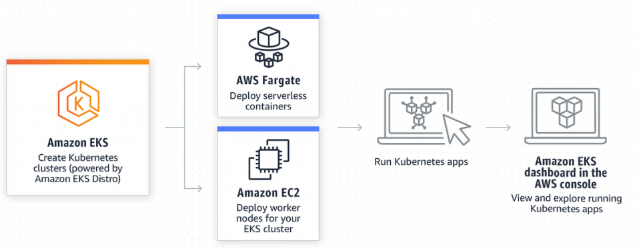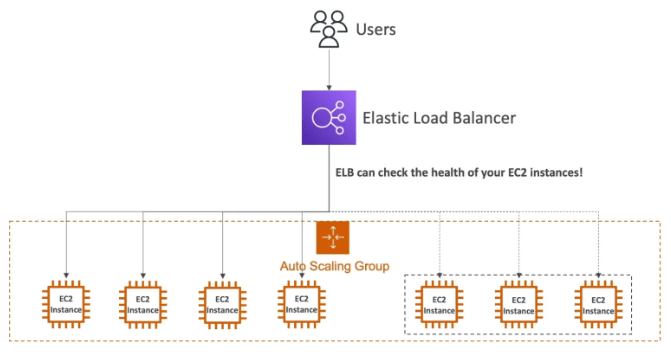
- Introduction to AWS Scalability
- Why Scalability Matters in Cloud Computing
- AWS Elastic Kubernetes Service (EKS) for Scaling Applications
- AWS Database Scaling Solutions (Aurora, DynamoDB, etc.)
- Cost-Effective Scaling with AWS Reserved Instances
- Security Considerations When Scaling with AWS
- AWS Case Studies on Scalability
- How Startups Benefit from AWS Scaling Capabilities
- Challenges in Scaling with AWS
- Future of Scalability in Cloud Computing
- Conclusion
Introduction to AWS Scalability
In the world of cloud computing, scalability is the ability of a system to handle a growing amount of work or its potential to be enlarged to accommodate that growth. Amazon Web Services (AWS), one of the largest and most popular cloud platforms globally, provides various tools and services that enable organizations to scale their resources efficiently in response to changing workloads. AWS Training scalability is designed to cater to the needs of businesses of all sizes, offering the flexibility to adjust resources dynamically and optimize performance while keeping costs under control. Scalability on Amazon Web Services allows companies to quickly respond to fluctuations in demand without the need for upfront investment in physical infrastructure. This flexibility empowers businesses to grow at their own pace, ensuring they can meet customer expectations and performance requirements while maintaining cost-efficiency.
Why Scalability Matters in Cloud Computing
- Handling Growing Demand: As businesses expand and customer demands fluctuate, scaling computing resources up or down ensures that services can meet increased load without degradation in performance. This is particularly important in e-commerce, where traffic spikes during holiday seasons or sales events are common.
- Optimizing Costs: Without proper scalability, businesses might need to over-provision their infrastructure to ensure they can handle peak loads, leading to inefficient resource utilization and high costs. Scalable cloud solutions, like AWS, allow businesses to adjust their resources in real time, minimizing costs while meeting performance requirements.
- Maintaining Performance: Scalability ensures systems maintain performance levels under heavy traffic, improving customer experience. Amazon Web Services provides features allowing businesses to adjust resources automatically based on real-time traffic and usage patterns, ensuring smooth performance.
- Flexibility and Agility: AWS’s scalable infrastructure makes businesses more agile. Automate Security With Devsecops Approach can experiment, innovate, and adapt quickly to new market opportunities without the need for long hardware procurement processes or the burden of maintaining underused infrastructure.
Learn the fundamentals of AWS with this AWS Certification Training .
AWS Elastic Kubernetes Service (EKS) for Scaling Applications
AWS Elastic Kubernetes Service (EKS) allows businesses to deploy, manage, and scale containerized applications using Kubernetes. Kubernetes is an open-source platform for automating container operations, and EKS simplifies the management of Kubernetes clusters by providing a fully managed service that integrates with other AWS services.
- Scaling with EKS: Kubernetes enables automatic scaling of application workloads by adjusting the number of replicas (pods) based on usage and performance metrics. EKS automatically scales the underlying infrastructure, so businesses don’t need to worry about manually configuring servers or Cloud Deployment Models. Integrating AWS services like Elastic Load Balancing and Auto Scaling ensures that applications are highly available and scalable.
- Containerization: Elastic Kubernetes Service also helps businesses scale their applications by running lightweight and portable containers, allowing them to scale efficiently across multiple environments. Containers ensure that applications run consistently regardless of the environment, whether on-premises or in the cloud.

AWS Database Scaling Solutions (Aurora, DynamoDB, etc.)
When it comes to databases, Amazon Web Services offers several scalable solutions that support high-performance and low-latency applications:
- Amazon Aurora: Amazon Aurora is a fully managed relational database service compatible with MySQL and PostgreSQL. Aurora is designed for high availability and durability and can automatically scale up to handle increasing workloads. Aurora automatically replicates data across multiple Availability Zones (AZs), ensuring fault tolerance and horizontal scaling for read-heavy workloads.
- Amazon DynamoDB: DynamoDB is a fully managed NoSQL database that can scale horizontally to handle massive amounts of AWS Training. It automatically scales to accommodate the required throughput for read and write operations without manual intervention. With on-demand scaling, DynamoDB handles fluctuating workloads while maintaining low latency.
- Amazon RDS: AWS RDS (Relational Database Service) offers scalable databases for MySQL, PostgreSQL, MariaDB, Oracle, and SQL Server. RDS offers automated backups, patching, and failover, and it supports vertical scaling (increasing the size of database instances) and horizontal scaling (using read replicas).
- Amazon Redshift: Amazon Redshift is a fully managed, scalable service for large-scale data analytics and warehousing. It allows businesses to scale data warehouses efficiently, adding or removing nodes based on demand.
- AWS Identity and Access Management (IAM): IAM allows you to control who can access and manage AWS resources, ensuring that only authorized users can change scaling policies and infrastructure.
- Encryption: AWS supports rest and transit encryption for all its services. As you scale, it’s critical to ensure that sensitive data is encrypted and that access is restricted to authorized users only.
- VPC Security: When scaling, it’s essential to configure your Virtual Private Cloud (VPC) properly, ensuring that security groups, subnets, and network ACLs are appropriately set up to protect resources from unauthorized access.
- Compliance: Scaling activities may involve handling large amounts of sensitive data, so it’s important to ensure that your AWS environment complies with industry standards such as GDPR, HIPAA, and SOC 2. AWS Amazon Comprehend NLP Solutions offers various compliance certifications to help businesses meet regulatory requirements during scaling.
- Netflix: Netflix uses AWS Database to manage its highly scalable infrastructure that serves millions of customers worldwide. The company uses AWS for data storage, compute power, and content delivery, ensuring it can scale its services dynamically to accommodate varying demand levels.
- Airbnb: It relies on AWS to handle fluctuating user traffic, especially during peak periods like holidays. Amazon Auto scaling and Elastic Load Balancing allow Airbnb to scale its infrastructure in Microsoft Azure Application Gateway and provide a seamless user experience.
- Zoom: During the COVID-19 pandemic, Zoom experienced an exponential increase in users and traffic. With AWS, Zoom was able to scale its infrastructure quickly to meet the demand, ensuring the platform could handle millions of new users without disruption.
- Cost-Effective Growth: Startups can scale resources on demand, ensuring that they only pay for what they use, which reduces the financial burden of overprovisioning infrastructure.
- Rapid Innovation: With AWS, startups can quickly experiment, scale their services, and launch new products without worrying about infrastructure management.
- Global Reach: AWS offers a worldwide network of data centers, enabling startups to scale and deliver AWS services to customers worldwide, regardless of their geographical location.
- Cost Management: If not appropriately managed, scaling on AWS can lead to high costs, especially if auto-scaling and resource provisioning are not optimized.
- Complexity: As infrastructure scales, managing Understanding the Cloud Native Applications can become more complex, requiring specialized knowledge of AWS services and configurations.
- Security Risks: Rapid Scaling Capabilities may increase the attack surface, making implementing robust security measures to prevent unauthorized access or data breaches essential.
- Edge Computing: With the rise of IoT, edge computing will allow for distributed scalability by processing data closer to the source, reducing latency and bandwidth requirements.
- AI-Powered Scaling: Artificial intelligence and machine learning will play a more significant role in optimizing resource allocation, allowing for predictive Scaling Capabilities based on usage patterns and demand forecasts.
- Hybrid Cloud Solutions: Businesses will increasingly adopt hybrid cloud strategies, combining on-premises infrastructure with cloud resources to achieve greater flexibility and scalability.
Learn how to manage and deploy cloud services by joining this AWS Certification Training today.
Cost-Effective Scaling with AWS Reserved Instances
While scalability is essential for performance, cost management is equally crucial for businesses. AWS offers Reserved Instances (RIs) as a cost-effective scaling solution for long-term workloads. Reserved Instances allow businesses to commit to using a specific amount of compute resources (e.g., EC2 instances) for a one- or three-year term, offering significant cost savings (up to 75%) compared to on-demand pricing. For businesses with predictable workloads, RIs provide a cost-effective way to scale up their infrastructure while benefiting from substantial discounts over the long term. By combining RIs with auto-scaling, businesses can create a hybrid approach using Reserved Instances for baseline capacity and auto-scaling for dynamic demand.
Security Considerations When Scaling with AWS
Scalability must be managed carefully to ensure security is not compromised as resources are scaled. AWS provides a range of security tools and practices to ensure that Scaling Capabilities activities do not introduce vulnerabilities:
Take charge of your AWS career by enrolling in ACTE’s AWS Master Training Course today!
AWS Case Studies on Scalability
AWS scalability has been implemented successfully across various industries, from startups to large enterprises. Here are a few notable case studies:
Are you getting ready for your AWS interview? Check out our blog on AWS Interview Questions and Answers!
How Startups Benefit from AWS Scaling Capabilities
Startups often face resource constraints and unpredictable workloads, which makes AWS scalability a perfect fit. The key benefits for startups include:
Challenges in Scaling with AWS
While AWS offers powerful scalability options, businesses may face challenges, such as:

Future of Scalability in Cloud Computing
The future of scalability in cloud computing will continue to evolve, with trends like:
Conclusion
AWS Database scalability provides businesses the flexibility, performance, and cost-efficiency they need to meet fluctuating demands and grow without limitations. By leveraging tools such as Auto Scaling, Elastic Load Balancing, serverless computing, and managed AWS services like Elastic Kubernetes Service and AWS Training , businesses can ensure that their infrastructure can scale dynamically to meet their needs. With proper planning and management, AWS Database allows companies to scale seamlessly while optimizing costs and maintaining security.





